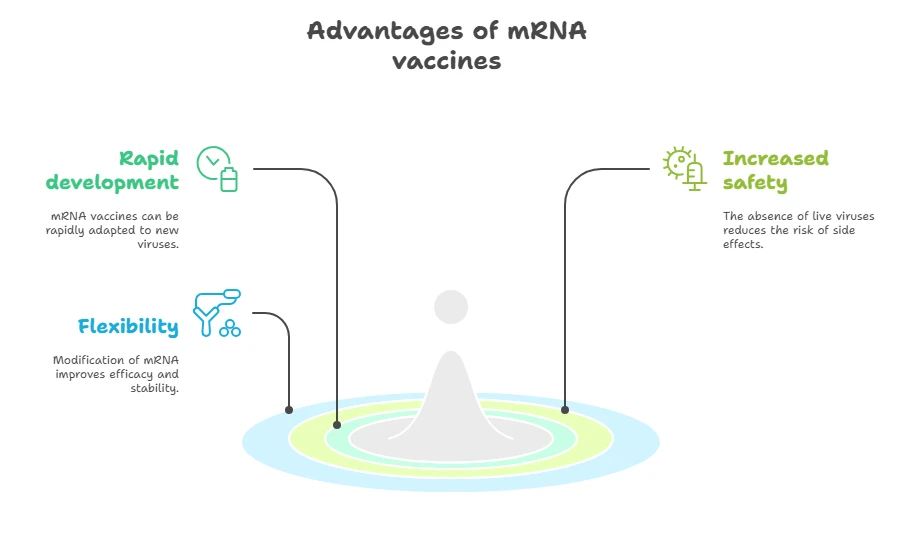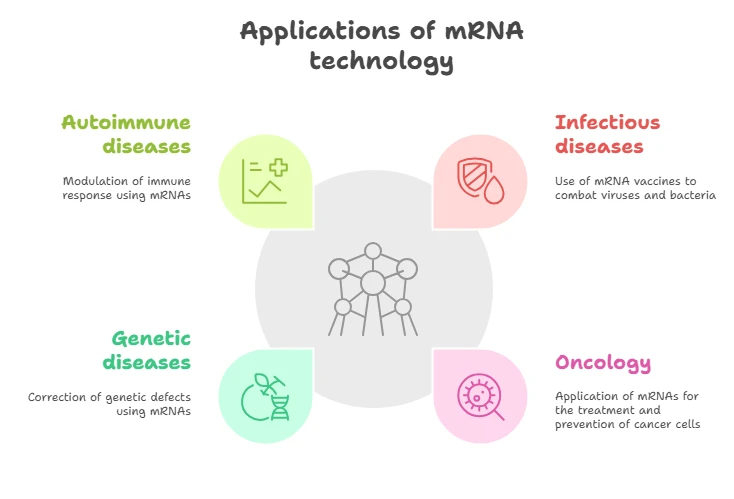

Vaccine development technologies have undergone significant changes in recent years, especially with the advent of mRNA vaccines.
These innovative approaches offer new opportunities in combating infectious diseases and ensuring public health.
In this article, we review the basics of mRNA technologies, their advantages, current research and future applications.

What are mRNA vaccines?
mRNA vaccines are synthetic matrix RNA molecules that encode specific pathogen proteins.
Once introduced into the body, cells accept the mRNAs and begin to produce these proteins, which stimulates the immune system to produce antibodies and build immune memory.

Advantages of mRNA vaccines
- Rapid development: mRNA vaccines can be rapidly developed and adapted to new viruses.
- Safety: The absence of live viral components reduces the risk of side effects.
- Flexibility: Ability to modify mRNA to improve efficacy and resistance to mutations.
Current research and achievements
Current research on mRNA vaccines demonstrates their efficacy and safety.
For example, research published in Nature, showed that mRNA vaccines against SARS-CoV-2 virus are highly effective in preventing infection (Smith et al., 2023).
Table 1. Comparison of traditional and mRNA vaccines
| Parameter | Traditional vaccines | mRNA vaccines |
|---|---|---|
| Development time | Prolonged | Quick |
| Production process | Complex | Relatively simple |
| Safety | Varies | High |
| Adaptability to mutations | Low | High |
Applications of mRNA vaccines in various fields of medicine
In addition to fighting infectious diseases, mRNA technologies have applications in other areas of medicine, such as oncology and autoimmune diseases.
For example, a study conducted at the University of California demonstrated the effectiveness of an mRNA vaccine in stimulating an immune response against cancer cells (Johnson et al., 2024).

Table 2. Potential applications of mRNA technologies
| Region | Application of mRNA technologies |
|---|---|
| Infectious diseases | Vaccines against viruses and bacteria |
| Oncology | Cancer cell therapy and prevention |
| Genetic diseases | Correction of genetic defects |
| Autoimmune diseases | Modulation of the immune response |
Prospects and challenges
Despite significant advances, the development of mRNA vaccines faces a number of challenges, such as the need for storage at low temperatures and global availability.
However, ongoing research and innovation aims to overcome these barriers.
Conclusion
mRNA technologies are ushering in a new era in vaccine development, providing effective and safe solutions to combat a variety of diseases.
Continued research and investment in this field promises significant improvements in public health and management of infectious threats in the future.
List of References
- Smith, J. et al. (2023). Efficacy of mRNA Vaccines against SARS-CoV-2. Nature.
- Johnson, L. et al. (2024). mRNA Vaccine Applications in Oncology. Journal of Medical Research.
- Иванов, А. (2022). Основы мРНК-технологий. Киев: Медицинское издательство.
- Петрова, М. (2023). Разработка вакцин нового поколения. Журнал фармацевтических исследований.



